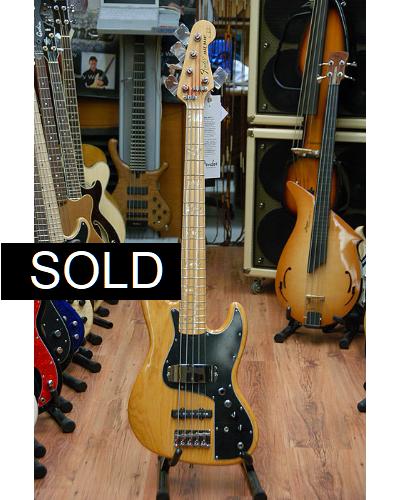This is the long awaited 5 string version of the Marcus Miller Signature bass.
As opposed to the Japanese made 4 string, the 5 string version is made in the US, using only top materials. Furthermore, Marcus joined the Fender R&D from the first day in order to develop a 5 string that he could be proud of.
As you probably know, simply making a 5 string version of a really good 4 stringer is no warranty at all that the bass will sound anything like it's cousin, and this does not only affect the sound and performance of the low B, but also the overall feel and sound of the instrument. With the 4 string version, it was just the Fender team recreating a bass as similar as possible to Marcus' own '77 Jazz Bass (and they did a great job, by the way), but in order to develop the 5 string version, they did not take anything for granted, and actually had to reject lots of bridges, preamps and pickup designs until they nailed it.
The result is a 5 string bass that really sounds and feels like a 4 string, and with a great low B that actually sounds like it is part from the same instrument (do you know what we mean?).
From Marcus Miller's website http://www.marcusmiller.com/
Marcus Miller:
"I've been working with Fender on the MM 5 (Marcus Miller 5 string model) for awhile now. It's the first time I really sat down and worked with someone on the design of a bass. The MM 4 is basically a copy of my existing 1977 4 string bass but I got into the 5 and worked to develop a bass that I would like.
The biggest difference is the curve of the neck (neck radius). The thing that bothers me about most 5's is that the necks feel very flat. It starts to feel like a classical acoustic guitar. For the MM 5 we worked on making the neck radius more round - more in the direction of the curve of an acoustic bass neck (although not as drastic). The result is an instrument that feels REALLY good in your hands. Guys at Fender said this was the best feeling 5 string they ever played.
The spacing between the strings is great for slapping or finger style. Some 5 strings are difficult to slap on because the strings are so close together. I also feel like close spacing prevents you from really digging into a note. It's cool when you're playing certain styles where you are really concentrating on your bass. But when you're in the middle of some funk or when you're headbanging or dancing and playing, you really need to be able to dig into your notes!
Next, we worked on the tuning of the pre-amp. This is where you determine what frequencies the pre-amp will affect. We started with a tuning similar to my 4 string then adjusted it to help the B string sound like it blends in with the rest of the instrument. We also worked to give the bass a great sound with the pre-amp off. This is a sound I've been using more and more. When you play with the pre-amp off, it sounds more like a classic Jazz Bass - more growly.
The bridge is a new design from Fender. We went through a bunch of bridges (they were sending me all sorts of bridges made from all types of exotic metals!) and decided that this one felt/sounded the best.
What I like best about the bass is that it still has that classic feel and sound. If Fender had made a 5 string bass in 1977, this would be it.
With this bass, you can play as modern as you want or as 'old school' as you want and you won't have to change basses.
The MM 5 is produced here in the states, as opposed to the MM 4 which is made in Japan. The extra features along with the domestic production is what accounts for the increase in price. The MM 5 is still inexpensive compared to other 5's (btw, the 4 string is a ridiculous bargain in my opinion!)."





